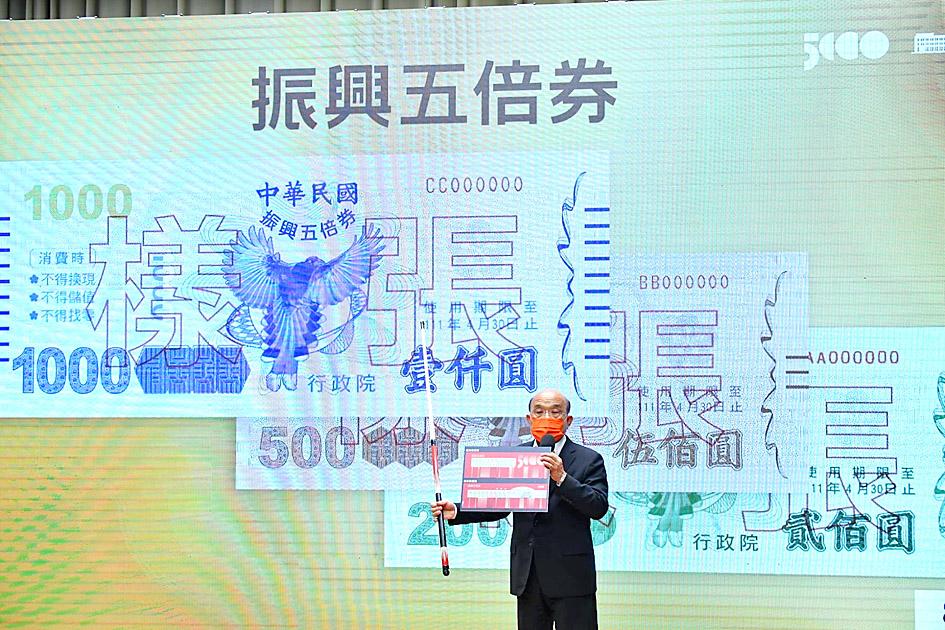The Quintuple Stimulus Voucher program has been finalized and Oct. 8 set as the issuance date, while an economic benefit of up to NT$200 billion (US$7.21 billion) is expected, the Executive Yuan said yesterday.
Premier Su Tseng-chang (蘇貞昌) disclosed the program details at a news conference in Taipei.
The vouchers would be offered in print or electronic versions to Taiwanese; their foreign, including Chinese, spouses; holders of Alien Permanent Resident Certificates; and diplomats, Su said.

Photo: Lee Hsin-fang, Taipei Times
People can register for digital vouchers from Sept. 22 via 5000.gov.tw or other digital payment platforms, while registration for print vouchers is available at convenience stores from Sept. 25 and at post offices from Oct. 4, Su said.
The vouchers could be used as payment at restaurants, street markets, department stores, hotels, cram schools, concerts, sports events, tourism-related businesses and Taiwanese online retailers, as well as public schools for miscellaneous fees, he said.
Online retailers and deliverers were not excluded because they agreed to work with the government in helping local businesses and small farmers, he said.

Photo: Wang Shu-hsiu, Taipei Times
In exchange for being allowed to participate, online businesses would reduce transaction and advertisement fees charged to small businesses and farmers, Su said.
Platform compliance would be monitored by the Ministry of Economic Affairs, while Minister Without Portfolio Audrey Tang (唐鳳) would help them design the technologies needed to implement their part, he said.
Barcodes and QR codes facilitating the vouchers’ use at brick-and-mortar stores and online venues would be issued to voucher recipients, he said.
The vouchers could not be used for transactions connected with stock trades, investment products, taxes, credit card fees, fines, foreign-based online retailers, tobacco products or buying other types of vouchers, Su said.
The vouchers are designed to function as a currency with a use-by date, he said.
The voucher program — which is being reviewed by the Legislative Yuan — is expected to add NT$200 billion to the economy, although the actual results could vary due to the COVID-19 situation and other factors, National Development Council Minister Kung Ming-hsin (龔明鑫) said.
The vouchers would come in several denominations and each recipient would have a set worth NT$5,000, Minister of Economic Affairs Wang Mei-hua (王美花) said.
Store owners might give change for the vouchers, but would not be required to do so, she said.
Separately, central bank Governor Yang Chin-long (楊金龍) said that the vouchers would be printed using nearly the same technologies that keep nation’s currency from being counterfeited, making them difficult to fake.
The central bank would soon air public service announcements showing store owners and clerks how to spot fake vouchers, he said.
On Aug. 19, an Executive Yuan official said on condition of anonymity that holders of an Alien Permanent Resident Certificate or a diplomatic identification card would likely be eligible for the voucher program.
The 13,000 foreigners who were eligible for the Triple Stimulus Voucher program would also be eligible for the Quintuple Stimulus Vouchers, the official added.
Additional reporting by CNA and Yang Chun-hui

The US government has signed defense cooperation agreements with Japan and the Philippines to boost the deterrence capabilities of countries in the first island chain, a report by the National Security Bureau (NSB) showed. The main countries on the first island chain include the two nations and Taiwan. The bureau is to present the report at a meeting of the legislature’s Foreign Affairs and National Defense Committee tomorrow. The US military has deployed Typhon missile systems to Japan’s Yamaguchi Prefecture and Zambales province in the Philippines during their joint military exercises. It has also installed NMESIS anti-ship systems in Japan’s Okinawa

‘WIN-WIN’: The Philippines, and central and eastern European countries are important potential drone cooperation partners, Minister of Foreign Affairs Lin Chia-lung said Minister of Foreign Affairs Lin Chia-lung (林佳龍) in an interview published yesterday confirmed that there are joint ventures between Taiwan and Poland in the drone industry. Lin made the remark in an exclusive interview with the Chinese-language Liberty Times (the Taipei Times’ sister paper). The government-backed Taiwan Excellence Drone International Business Opportunities Alliance and the Polish Chamber of Unmanned Systems on Wednesday last week signed a memorandum of understanding in Poland to develop a “non-China” supply chain for drones and work together on key technologies. Asked if Taiwan prioritized Poland among central and eastern European countries in drone collaboration, Lin

Renewed border fighting between Thailand and Cambodia showed no signs of abating yesterday, leaving hundreds of thousands of displaced people in both countries living in strained conditions as more flooded into temporary shelters. Reporters on the Thai side of the border heard sounds of outgoing, indirect fire yesterday. About 400,000 people have been evacuated from affected areas in Thailand and about 700 schools closed while fighting was ongoing in four border provinces, said Thai Rear Admiral Surasant Kongsiri, a spokesman for the military. Cambodia evacuated more than 127,000 villagers and closed hundreds of schools, the Thai Ministry of Defense said. Thailand’s military announced that

CABINET APPROVAL: People seeking assisted reproduction must be assessed to determine whether they would be adequate parents, the planned changes say Proposed amendments to the Assisted Reproduction Act (人工生殖法) advanced yesterday by the Executive Yuan would grant married lesbian couples and single women access to legal assisted reproductive services. The proposed revisions are “based on the fundamental principle of respecting women’s reproductive autonomy,” Cabinet spokesperson Michelle Lee (李慧芝) quoted Vice Premier Cheng Li-chiun (鄭麗君), who presided over a Cabinet meeting earlier yesterday, as saying at the briefing. The draft amendment would be submitted to the legislature for review. The Ministry of Health and Welfare, which proposed the amendments, said that experts on children’s rights, gender equality, law and medicine attended cross-disciplinary meetings, adding that